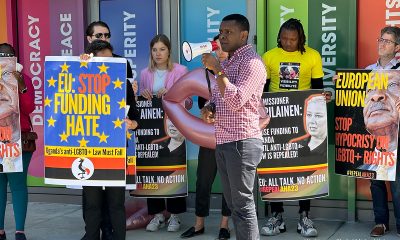News
Court allows lawsuit against U.S. pastor for helping with Uganda anti-gay bill
Judge determines LGBT people eligible for protection under int’l law


A U.S. district judge is allowing a case to proceed Scott Lively for fomenting anti-gay sentiment in Uganda. (Screen shot via YouTube).
A federal district court in Massachusetts announced on Wednesday it will allow a case to proceed against evangelical Christian Scott Lively for unlawfully fomenting anti-gay sentiment in Uganda and encouraging passage of the country’s pending “Kill the Gays” bill.
In a 79-page decision denying summary judgment in favor of Lively, U.S. District Judge Michael Ponsor refers the case to Magistrate Judge Kenneth Neiman for a pretrial scheduling conference.
“The history and current existence of discrimination against LGBTI people is precisely what qualifies them as a distinct targeted group eligible for protection under international law,” Ponsor writes. “The fact that a group continues to be vulnerable to widespread, systematic persecution in some parts of the world simply cannot shield one who commits a crime against humanity from liability.”
Lively, president of the California-based Abiding Truth Ministries, is known for advocating that gay people should be jailed — even in countries overseas. In 2009, Lively was one of three pastors who went to Uganda to deliver a series of talks on the threat of homosexuality to African society.
According to the New York Times, Lively, in addition to these talks, met with Ugandan lawmakers to discuss the now infamous anti-homosexuality legislation colloquially known as the “Kill the Gays” bill, which in some circumstances would institute the death penalty for homosexual acts. Still, Lively later reportedly said he doesn’t support a bill that includes the death penalty.
The California-based pastor has argued for the criminalization of homosexuality at least since 2007, when he wrote an open letter to the Russian people calling for them to make it illegal. The anti-gay propaganda law that has generated significant outcry in recent weeks is along the lines of what Lively envisioned in the letter.
“My philosophy is to leave homosexuals alone if they keep their lifestyle private, and not to force them into therapy if they don’t want it,” Lively wrote “However, homosexuality is destructive to individuals and to society and it should never publicly promoted. The easiest way to discourage “gay pride” parades and other homosexual advocacy is to make such activity illegal in the interest of public health and morality.”
The lawsuit was filed against Lively in March 2012 by the Massachusetts-based Center for Constitutional Rights on behalf of Sexual Minorities Uganda, or SMUG, a Uganda LGBT group working to stop passage of the Uganda’s anti-homosexuality law.
Frank Mugisha, the director of SMUG, told the Washington Blade he’s “very pleased the court ruled to proceed” with the case against Lively.
“This shows that no one can violate international and abuse human rights,” Mugisha said. “LGBT rights are universal.”
The Center for Constitutional Rights is suing Lively on the basis of state law and the Alien Tort Statute, which allows U.S. courts to hear human-rights cases brought by foreign citizens for conduct committed outside the United States. The organization is seeking compensatory damages, declarative relief that Lively’s actions violated the law of nations and an injunction prohibiting him for engaging in such activity again.
Pam Spees, a senior staff attorney with the Center for Constitutional Rights, said she’s “elated” the court allowed the case to proceed.
“I think it’s going to have a long-term effect in different places, not only in Uganda, but elsewhere where persecution is happening in this way,” Spees said. “The recognition that LGBT people are entitled to the same protections as anyone else and are entitled to be protected against persecution like any other group is a historic confirmation that this is a basic fundamental principle of international law.”
The social conservative legal firm known as the Liberty Counsel is representing Lively in the case. The organization didn’t immediately respond to the Blade’s request to comment, but Spees said she expects his attorneys to appeal one or more of the grounds the court cited to allow the case to proceed. Resolution to the case, Spees said, could take a number of years.
Mark Bromley, chair of the LGBT international group Council for Global Equality, said the court’s decision to allow the case to proceed “is both persuasive and groundbreaking” because it establishes persecution LGBT people may constitute a crime against humanity.
“This is also a small but important first step in exposing those who seek to export homophobia from the United States to the rest of the world,” Bromley added. “And I hope it serves as a common-sense warning to those political and religious leaders around the world who continue to target LGBT individuals for their own selfish political gain.”
State Department
State Department releases annual human rights report
Antony Blinken reiterates criticism of Uganda’s Anti-Homosexuality Act

Secretary of State Antony Blinken on Monday once again reiterated his criticism of Uganda’s Anti-Homosexuality Act upon release of the State Department’s annual human rights report.
“This year’s report also captures human rights abuses against members of vulnerable communities,” he told reporters. “In Afghanistan, the Taliban have limited work opportunities for women, shuttered institutions found educating girls, and increasing floggings for women and men accused of, quote, ‘immoral behavior,’ end quote. Uganda passed a draconian and discriminatory Anti-Homosexuality Act, threatening LGBTQI+ individuals with life imprisonment, even death, simply for being with the person they loved.”
Ugandan President Yoweri Museveni last May signed the law, which contains a death penalty provision for “aggravated homosexuality.”
The U.S. subsequently imposed visa restrictions on Ugandan officials and removed the country from a program that allows sub-Saharan African countries to trade duty-free with the U.S. The World Bank Group also announced the suspension of new loans to Uganda.
Uganda’s Constitutional Court earlier this month refused to “nullify the Anti-Homosexuality Act in its totality.” More than a dozen Ugandan LGBTQ activists have appealed the ruling.
Clare Byarugaba of Chapter Four Uganda, a Ugandan LGBTQ rights group, on Monday met with National Security Council Chief-of-Staff Curtis Ried. Jay Gilliam, the senior LGBTQI+ coordinator for the U.S. Agency for International Development, in February traveled to Uganda and met with LGBTQ activists who discussed the Anti-Homosexuality Act’s impact.
“LGBTQI+ activists reported police arrested numerous individuals on the basis of their sexual orientation or gender identity and subjected many to forced anal exams, a medically discredited practice with no evidentiary value that was considered a form of cruel, inhuman, and degrading treatment and could amount to torture,” reads the human rights report.
The report, among other things, also notes Ugandan human rights activists “reported numerous instances of state and non-state actor violence and harassment against LGBTQI+ persons and noted authorities did not adequately investigate the cases.”
Report highlights anti-LGBTQ crackdowns in Ghana, Hungary, Russia
Ghanaian lawmakers on Feb. 28 approved the Promotion of Proper Human Sexual Rights and Ghanaian Family Values Bill. The country’s president, Nana Akufo-Addo, has said he will not sign the measure until the Ghanaian Supreme Court rules on whether it is constitutional or not.
The human rights report notes “laws criminalizing consensual same-sex sexual conduct between adults” and “crimes involving violence or threats of violence targeting lesbian, gay, bisexual, transgender, queer or intersex persons” are among the “significant human rights issues” in Ghana.
The report documents Hungarian Prime Minister Viktor Orbán and members of his right-wing Fidesz party’s continued rhetoric against “gender ideology.” It also notes Russia’s ongoing crackdown against LGBTQ people that includes reports of “state actors committed violence against LGBTQI+ individuals based on their sexual orientation or gender identity, particularly in Chechnya.”
The report specifically notes Russian President Vladimir Putin on July 24 signed a law that bans “legal gender recognition, medical interventions aimed at changing the sex of a person, and gender-affirming care.” It also points out Papua New Guinea is among the countries in which consensual same-sex sexual relations remain criminalized.

The Cook Islands and Mauritius in decriminalized homosexuality in 2023.
The report notes the Namibia Supreme Court last May ruled the country must recognize same-sex marriages legally performed outside the country. The report also highlights the Indian Supreme Court’s ruling against marriage equality that it issued last October. (It later announced it would consider an appeal of the decision.)
Congress requires the State Department to release a human rights report each year.
The Biden-Harris administration in 2021 released a memorandum that committed the U.S. to promoting LGBTQ+ and intersex rights abroad.
The full report can be read here.

Dominica’s High Court of Justice on Monday struck down provisions of a law that criminalized consensual same-sex sexual relations.
A gay man who remains anonymous in 2019 challenged sections of the country’s Sexual Offenses Act that criminalized anal sex and “gross indecency” with up to 10 years and 12 years in prison respectively. The plaintiff argued the provisions violated his constitutional rights.
The Dominica Equality and Sexual Expression Association and the Eastern Caribbean Alliance for Diversity and Equality, a group that advocates for LGBTQ and intersex rights in the region, in a press release noted the court in its ruling affirmed “the criminalization of consensual same-sex activity between adults is unconstitutional.” The groups added Justice Kimberly Cenac-Phulgence “declared that the laws commonly known as buggery and gross indecency laws, contravenes the constitution of the Commonwealth of Dominica, namely the right to liberty, freedom of expression, and protection of personal privacy.”
“It is long past time that the dignity and dreams of all Dominicans were recognized,” said DESEA Executive Director Sylvester Jno Baptiste in the press release. “We are all God’s children, and he loves us all equally. Laws that treat some Dominicans as less than others, have no place in a just society.”
Dominica is a former British colony that is located between Guadeloupe and Martinique in the Lesser Antilles.
Antigua and Barbuda, St. Kitts and Nevis, Barbados, and Trinidad and Tobago in recent years have decriminalized consensual same-sex sexual relations.
The Inter-American Commission on Human Rights in 2021 issued a decision that said Jamaica must repeal its colonial-era sodomy law. The country’s Supreme Court last year ruled against a gay man who challenged it.
A judge on St. Vincent and the Grenadines’s top court in February dismissed two cases that challenged the country’s sodomy laws.
“Decriminalization helps create an environment where LGBTQ individuals can live openly without fear of persecution, enabling them to access health care, education, and employment without facing discrimination,” said Outright Executive Director Maria Sjödin on Monday in response to the Dominica ruling. “The repeal of these discriminatory laws is a testament to the tireless efforts of activists, advocates, and allies who have long fought for justice and equality. It is a victory for human rights and a significant milestone in the ongoing struggle for LGBTQ rights in the Caribbean.”
Politics
Smithsonian staff concerned about future of LGBTQ programming amid GOP scrutiny
Secretary Lonnie Bunch says ‘LGBTQ+ content is welcome’

Staff at the Smithsonian Institution are concerned about the future of LGBTQ programming as several events featuring a drag performer were cancelled or postponed following scrutiny by House Republicans, according to emails reviewed by the Washington Post.
In December, Secretary Lonnie G. Bunch III appeared before a hearing led by GOP members of the Committee on House Administration, who flagged concerns about the Smithsonian’s involvement in “the Left’s indoctrination of our children.”
Under questioning from U.S. Rep. Stephanie Bice (R-Okla.), Bunch said he was “surprised” to learn the Smithsonian had hosted six drag events over the past three years, telling the lawmakers “It’s not appropriate to expose children” to these performances.
Collaborations with drag artist Pattie Gonia in December, January, and March were subsequently postponed or cancelled, the Post reported on Saturday, adding that a Smithsonian spokesperson blamed “budgetary constraints and other resource issues” and the museums are still developing programming for Pride month in June.
“I, along with all senior leaders, take seriously the concerns expressed by staff and will continue to do so,” Bunch said in a statement to the paper. “As we have reiterated, LGBTQ+ content is welcome at the Smithsonian.”
The secretary sent an email on Friday expressing plans to meet with leaders of the Smithsonian Pride Alliance, one of the two groups that detailed their concerns to him following December’s hearing.
Bunch told the Pride Alliance in January that with his response to Bice’s question, his intention was to “immediately stress that the Smithsonian does not expose children to inappropriate content.”
“A hearing setting does not give you ample time to expand,” he said, adding that with more time he would have spoken “more broadly about the merits and goals of our programming and content development and how we equip parents to make choices about what content their children experience.”
-

 District of Columbia5 days ago
District of Columbia5 days agoNew D.C. LGBTQ+ bar Crush set to open April 19
-

 South America3 days ago
South America3 days agoDaniel Zamudio murderer’s parole request denied
-

 Maryland4 days ago
Maryland4 days agoMontgomery County police chief discusses arrest of trans student charged with planned school shooting
-

 Politics5 days ago
Politics5 days agoCourt records raise concerns about right-wing TikTok investor’s influence










